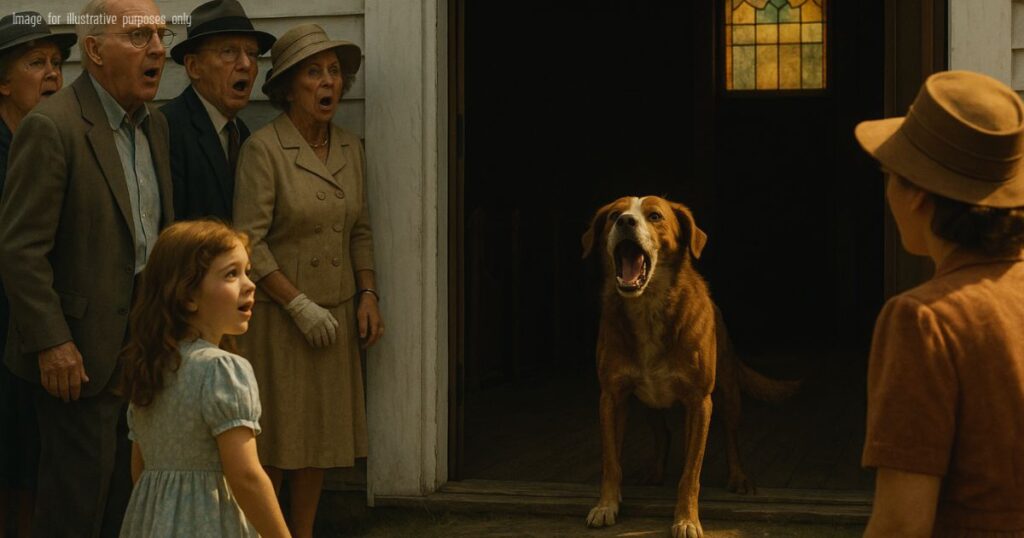Part 9: The Dust We Don’t Sweep Away
Late Summer Turns to Fall – McCall, Alabama
The wax from the candle hardened in the shape of a paw.
Not perfect—just close enough to feel true.
Like Mercy himself. A little crooked. A little weathered. But unmistakably sent.
Nobody scrubbed it off.
Mrs. Thelma even stitched a tiny cloth square to place beneath it, with soft embroidery:
“Mercy sat here.”
It became part of the pew’s story—like the threadbare cushion, like the collar, like the harmonica behind glass.
Like the unspoken pull that brought folks back each week, even when the coffee was bitter and the choir a little off-key.
By September, the church added a new entry to its weekly bulletin.
“Offerings left on Mercy’s pew this week:”
— A photograph of a young woman with missing front teeth, dated 1954
— A note that read: “You did your best. That was enough.”
— A single shoelace, neatly tied
— A daisy in a buttonhole
They started calling it The Listening Pew.
And it did listen.
Because people talked to it. Cried into it. Sat on it when they couldn’t make it through a whole service.
Elsie once found the preacher’s own Bible resting there, open to Isaiah 43:2.
“When you pass through the waters, I will be with you.”
One day in early fall, a stranger came.
A woman in her seventies, thin scarf wrapped under her chin, the kind of face the wind doesn’t surprise anymore.
She walked straight to the pew.
Didn’t introduce herself. Didn’t take a bulletin. Didn’t even look around.
She just sat down.
Closed her eyes.
And whispered:
“Scout?”
No one answered.
But Elsie, watching from her usual seat, swore she saw the woman smile the exact smile her Grandpa Clarence used to wear when the harmonica hit just right.
After service, Elsie approached her.
The woman’s name was Evelyn.
She’d grown up in McCall, left after high school, and never came back.
“Scout was Clarence’s dog, wasn’t he?” she asked.
Elsie nodded.
Evelyn’s voice cracked. “Scout was mine first. When I was a girl.”
Elsie blinked. “Then… how did Grandpa—?”
“He found him one winter, half-starved and shaking near the train tracks. Brought him home. I was off chasing a life I thought I wanted.”
She smiled through tears.
“Scout traded up.”
They sat together a while, Evelyn and Elsie, beside the old paw-print wax and the faded collar, saying nothing.
Just letting the air between them settle like dust that should never be swept away.
October brought crisp mornings and gold in the leaves.
Mercy’s memory thickened in the air, the way woodsmoke does—unexpected, comforting, and suddenly everywhere at once.
One Sunday, the children’s choir gathered near the pew to sing.
They left dog biscuits wrapped in ribbon afterward.
Later that night, someone swore they heard paws across the church floor.
Preacher Myron smiled when told.
“Even heaven has visitation hours,” he said.
Elsie drew again.
This time, she sketched the pew alone.
No Scout. No Mercy. Not even Clarence.
Just the empty space—warm, worn, waiting.
And across the backrest, she wrote:
“The pew belongs to whoever needs it most.”
She pinned it to the sanctuary wall just beside the vestibule.
And left a pencil dangling on a string.
So others could add to it.
So the story could keep growing.
That night, Elsie lay in bed with Mercy’s collar under her pillow, and her Grandpa’s harmonica resting near the window.
Outside, the wind stirred the trees.
And just before she fell asleep, she heard it.
That soft, familiar sound.
A low sigh.
Not wind.
Not dream.
But the kind of breath that means: Still here. Still listening.


